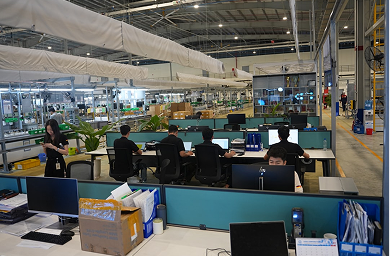In the context of globalization and rapid technological advancement, the semiconductor industry has become a cornerstone and focal point of the modern economy. In Vietnam, with significant investment from multinational companies (FDI), job opportunities for unskilled labor in the semiconductor sector appear to be promising, but they also carry considerable risks. The rising demand for unskilled workers in industrial zones is a positive sign, offering new prospects for the labor market. However, alongside the potential promises, there are realities that need to be acknowledged with depth and caution.
The Surge of Employment Opportunities in the Semiconductor Industry
Since 2023, the semiconductor sector in Vietnam has seen remarkable growth, with a wave of FDI companies investing in major industrial zones, especially in regions like Bac Ninh, Thai Nguyen, and Ho Chi Minh City. According to the latest report by the Ministry of Labor, Invalids, and Social Affairs, the demand for unskilled labor, particularly production workers in electronics and semiconductor factories, has increased by an average of 15% per year. Many businesses are offering attractive wages and benefits to attract workers, especially as Vietnam is expected to become a new semiconductor manufacturing hub in Asia by 2025.

The job opportunities in industrial zones are evident as thousands of new positions are created, not only providing employment but also improving the quality of life for local residents. The recruitment efforts by FDI companies in 2025 are also part of a larger strategy to place Vietnam on the global supply chain map. This is a positive signal, bringing not only income but also opportunities for unskilled labor to enhance their skills.
However, no opportunity is without risk, especially in a highly competitive environment with stringent productivity demands.
Potential Risks from Working Conditions and Production Pressure
The semiconductor industry requires workers not only to have skills and adaptability but also to face various health and mental challenges. A report from the International Labor Organization (ILO) indicates that working in semiconductor manufacturing environments can have adverse effects on health if workers are not equipped with adequate safety knowledge. This environment often involves exposure to hazardous chemicals and demands high precision, which can lead to respiratory, dermatological, and even neurological issues if proper protection is not in place.

Moreover, the intense production pressure, along with the demand for speed and quality, causes significant stress and fatigue among many workers. Particularly in FDI companies, productivity is a vital factor, requiring workers to keep up with a continuous workflow. This not only negatively impacts their health but also affects their long-term commitment to their jobs.
Promotion and Learning Opportunities
While FDI companies offer broad job opportunities, the advancement path for unskilled labor remains limited. Due to the nature of the work, which mainly involves assembly and production, unskilled workers typically have few opportunities to enhance their skills or expertise. Although some companies have training policies, promotional positions are often reserved for employees with higher qualifications and skills.
The lack of advanced training programs and opportunities for skill enhancement forces many unskilled workers to accept stable jobs without further skill development. For many, this becomes an endless loop, preventing them from progressing beyond entry-level positions and making them entirely dependent on opportunities from FDI companies.
Trends and Future Prospects for Unskilled Labor in Vietnam's Semiconductor Industry
In the future, particularly after 2025, Vietnam is expected to witness a significant shift from manual production to automation in the semiconductor industry. This could pose a major challenge for unskilled labor as high technology gradually replaces human roles in various production stages. However, it could also be an opportunity if workers are willing to learn and improve their skills.
According to statistics from the Ministry of Industry and Trade, by 2025, the demand for unskilled labor is expected to decrease slightly, while the need for skilled labor with technological expertise will increase. Therefore, to sustain and grow their careers, workers need to proactively learn, improve their skills, and adapt to changes in the workplace.
How to Maximize Opportunities and Minimize Risks?
One of the crucial factors for unskilled workers to take full advantage of opportunities is to acquire industry knowledge and continuously improve their skills. Short-term training programs or skill courses can help them familiarize themselves with new technology, thus enhancing adaptability and creating a competitive edge in their work. At the same time, FDI companies should support these efforts by organizing training sessions and providing opportunities for workers to upgrade their skills.
Additionally, raising awareness of workplace safety and understanding their rights and responsibilities will help lunskilled labor avoid unnecessary risks. Government agencies and businesses should also collaborate closely to build a safe working environment, allowing workers to feel secure in their roles.
The semiconductor industry brings significant opportunities for unskilled workers in Vietnam, especially during a period when FDI companies are intensifying investments and expanding operations. However, workers need to clearly recognize the potential risks in the workplace, productivity pressures, and limitations in career advancement. To truly turn these opportunities into advantages, efforts from workers themselves, support from businesses, and sound policies from regulatory agencies are essential.
Zalo GLA – HR: Việc làm kỹ sư can get HOT JOB opportunities now.


